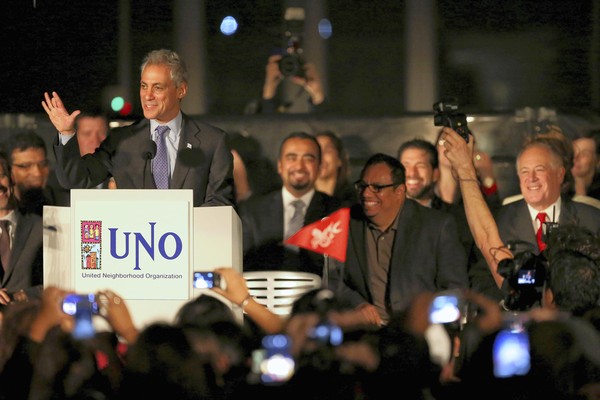
The Chicago teachers strike was settled relatively quickly, but it's almost certain that it was merely a preview of issues to come: school closings, pensions, and the expansion of charter schools, for example. Ben Joravsky has been writing about the last of these for awhile, and he takes another shot across the bow this week on what's certain to be a point of contention in the coming years.
There are 541 elementary schools in Chicago. Based on the composite ISAT scores for 2011—the last full set available—none of the top ten are charters. None of the top 20, 30, or 40 either.
In fact, you've got to go to 41 to find a charter. Take a bow, CICS Irving Park!
Most of the 49 charters on the list are clustered near the great middle, alongside most of their unionized neighborhood schools.
It's not that Joravsky is instinctively anti-charter; in a 2011 piece about how charters have the ability to kick out, flunk out, or lose students by attrition—failing students have to pay $140 for makeup courses at Noble Street, for instance, which some parents can't afford or won't pay for—he defends the idea of choice, but also points out that this gives charter schools a structural advantage over open-enrollment public schools.
Meanwhile, over at District 299, Andrew Broy of the Illinois Network of Charter Schools takes Joravsky to task over his statistics, without actually denying them:
Of course you have to omit selective enrollment schools from the comparison since they screen for test scores on the way in. He also ignores charter high schools entirely, which are higher performing, on a relative basis, than charter elementaries. We also think growth scores are a much better indicator of quality than ISAT status data, and charters do quite well there.
Neither is necessarily wrong. Both their contentions line up with a 2009 RAND paper that takes a look at charter schools across the country, including Chicago specifically. Broadly speaking, Joravsky and Broy are both right: they found no evidence that charter elementaries or middle schools are much better or worse in Chicago, but the high schools are arguably "higher performing," at least by one very important metric.
* The researchers' first point is that it's difficult to measure the impacts of elementary charter schools, because there are no prior test scores for comparison. Insofar as they did comparisons, there wasn't much impact in elementary and middle school: "in a majority of cases, the results suggest that differences in the performance of charter schools and TPSs [traditional public schools] are small or nonexistent. In these cases, the gains of students attending charter schools are on par with the gains these same students experienced in TPSs. With those caveats, it lines up with what Joravsky found: they're fine, not particularly better or worse than public schools.
* For Chicago charter middle schools, the researchers found a statistically significant, "moderate" negative effect on reading test scores (and a nonsignificant impact in math), across black, white, and Hispanic students. Charter schools are at something of a disadvantage because new charter schools tend to do worse, and then improve; again, the overall results are kind of middling.
* But this speaks to Broy's point about high schools:
In Chicago, 68 percent of charter-middle school students who transitioned to a TPS in grade 9 eventually received their high-school diplomas, whereas 75 percent of students who transitioned to a charter high school received their diplomas. Similar differentials are found for college attendance as well…. In Chicago, the gap in college attendance is smaller [than in Florida] but still sizable: 49 percent for charter-high school attendees and 38 percent for charter-middle school students who go to a traditional public high school.
[snip]
The findings for college attendance… are remarkably similar in Florida and Chicago. A student who attended a charter school in eighth grade and transitioned to a charter high school in ninth grade is 8 to 10 percentage points more likely to attend a post-secondary institution within five years of starting high school than a similar student who attended a traditional public high school.
Even controlling for school size and achievement, the authors found similar effects. And this is particularly interesting (emphasis mine): "our positive results are promising and are not fully explained by estimated impacts on test scores, suggesting that researchers need to look beyond test scores to fully assess charters' performance. In one of the two locations (Chicago), the estimated positive attainment effects could be related (at least in part) to eliminating the school transition between middle school and high school."
In other words, the charter schools don't necessarily improve students' performance, at least as measured by tests, but seem more likely to send students on to college. Charters aren't alone in this success; there's evidence that Chicago Public Schools has improved post-secondary attendance just by helping students through the arcane and frustrating maze of financial-aid applications, and riding them to complete the forms. The authors suggest that a broader push towards college might explain charter schools' success: as with Catholic schools, a "coherent, pervasive educational mission."
Charter education is still very new, at least in comparison to traditional public education, so the data's not as robust. But it suggests outcomes at some moderate point in between the poles of rhetoric: charters aren't a silver bullet; they might not even raise achievement all that much, as far as test scores go; but they do seem to do some things right, such as an intensive focus on post-secondary education and a different approach to the middle school-high school transition. It doesn't obviate the need for improving traditional schools or prove charters' universal superiority, but it does suggest models to learn from, instead of the oppositional, antagonistic relationship the two models are often forced into.
Photograph: Chicago Tribune


